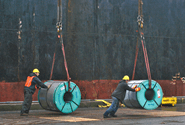Government/Policy

June 15, 2023
Commerce Updates AD Duty Rates on Korean Hot Rolled
Written by Laura Miller
The US Department of Commerce’s International Trade Administration (ITA) is updating the antidumping duties on hot-rolled steel flats from South Korea.
In an administrative review of the one-year period ended Sept. 30, 2022, the ITA set preliminary dumping margins of 0% for Hyundai Steel, Posco, and 45 other Korean companies not selected for individual examination.
The all-others cash deposit rate remains set at 6.05%.
The ITA will issue the final results of the review by mid-October.
In the review of the prior one-year period ended Sept. 30, 2021, dumping rates were set at 0% for Posco and 0.84% for Hyundai and a handful of other companies.
Note that no duties are collected on de minimis dumping rates below 0.5%.
South Korea is typically one of the largest offshore suppliers of hot-rolled steel to the US. In the first four months of this year, just over 16,000 metric tons of Korean hot rolled was imported. Data from the US government shows 5,489 metric tons of import licenses for May and a June spike to 41,286 metric tons through the first 12 days of the month.
By Laura Miller, laura@steelmarketupdate.com







